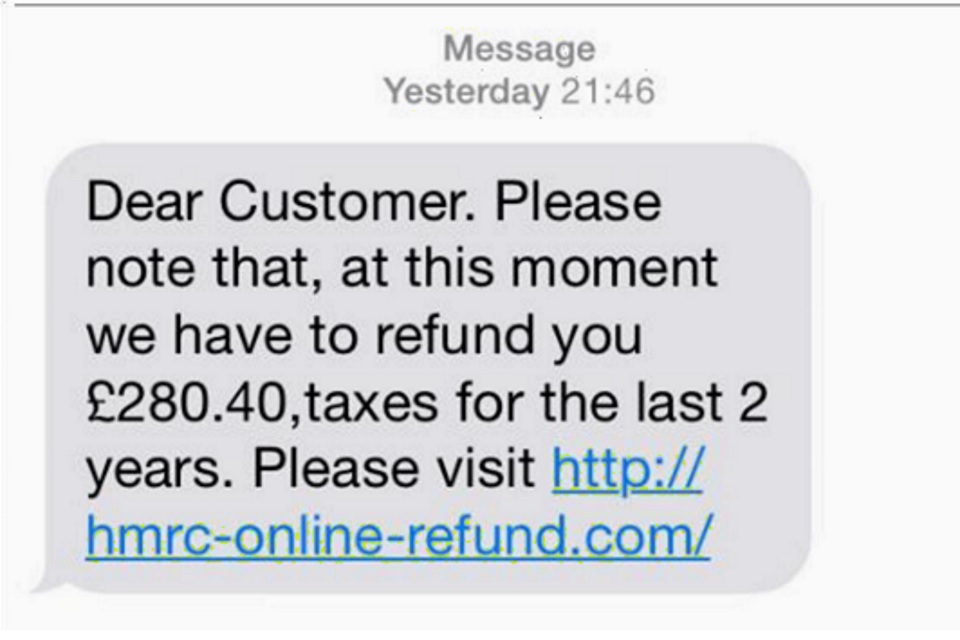The best way to avoid getting caught out by online scammers who are after your money is to start with the knowledge that HM Revenue  and Customs (HMRC) will never use texts or emails to:
and Customs (HMRC) will never use texts or emails to:
- tell you about a tax rebate or penalty
- ask for personal or payment information
If you’re still unsure whether a text message or email is genuine check HMRC’s guidance on recognising scams which is regularly updated with details of scams currently in operation.
If you do receive a suspicious text message you should forward it onto 60599, bear in mind sent on text messages will be charged at your network rate. You can also forward suspicious emails to HMRC’s phishing team at phishing@hmrc.gsi.gov.uk make sure you then delete it. Do not follow any links within it or open any attachments within the email or text message, as they may contain malicious software or direct you to a bogus website.
Even if you receive the same or similar phishing email or text message on multiple occasions it’s still worth sending it on to HMRC. You’d probably be correct in assuming that you’re not the only person who will have received it, but HMRC still want sight of all ‘HMRC related’ phishing emails and bogus text messages as it helps their investigations to close down the scammers.
Scam email addresses
Some of the email addresses used for phishing emails can be, at first glance, convincing. A selection of scam email addresses used to distribute the tax rebate emails are given below:
- reve.alert@hmrc.gov.uk
- services@hmrc.co.uk
- noreply@hmrevenue.com
- service@hmrc.gov.uk
- service.refund@hmrc.gov
- secure@hmrc.co.uk
- hmrc@gov.uk
- taxes@hmrc.co.uk
- taxrefund-notice@hmrc.gov.uk
- taxrefund@hmrc.gov.uk
- refund-help@hmrc.gov.uk
- service@online.com
- email@hmrc.gov.uk
- refund.alert@hmrc.gov.uk
- refunds@hmrc.gov.uk
- srvcs@hmrc.gov.uk
- alertsonline@hmrc.co.uk
- info@hmrc.gov.uk
- rebate@hmrc.gov.uk
HMRC does not use any of the above email addresses.
Whilst most HMRC scams involve use of online routes ther
Recorded message threatening Legal Action
There is currently a telephone scam where a recorded message is left, allegedly from HMRC, stating that HMRC are bringing a lawsuit against the individual and are going to sue them. The recipient is asked to phone 0161 8508494 and press ‘1’ to speak to the officer dealing with the case. This scam is becoming widely reported and seems to be targeting older people.
Request to complete NRL1 forms and return by fax
Lettings agents and landlords living abroad are also being targeted by a series of scams. These request completion of a form NRL1 (by email, letter or fax) and ask for a considerable amount of personal information.
These forms (which may be headed ‘Application for Withholding Certificate for Dispositions by Foreign Persons of UK Real Property Interests’ or ‘Application for a tax-free account and to receive rental income without deduction of tax for Non-UK Residents’) are not issued by HMRC and should not be completed.
HMRC will never ask you to disclose personal information by email or fax.
Whilst you need to be wary of scam HMRC communication we strongly advise that you don’t bury your head in the sand when it comes to real letters from the taxman. If you’d like our help in managing any HMRC communication including enquiries and disputes get in touch with us today. Take a look here to see how we can potentially help.
